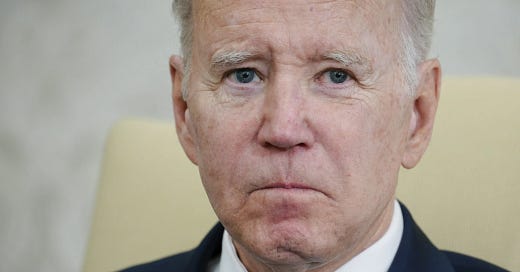Thanks for being a free subscriber. If you like what you’re reading, maybe it’s time to upgrade to a paid subscription.
This newsletter is 100% reader-supported, and subscriptions allow me to continue publishing.
When you become a paid subscriber, you receive access to all my posts, the ability to comment on posts and engage in the Truth and Consequences community, and, above all, you get the warm and fuzzy feeling that comes with supporting independent journalism! Your support is so appreciated!
Jake Tapper and Alex Thompson are about to publish a new book about the alleged White House cover-up of Joe Biden’s age-related infirmities. This week, they published an excerpt in the New Yorker.
I have some concerns.
At the outset, let me make clear that I take no issue with journalists investigating whether the White House lied to the American people about Biden’s capabilities. From a historical standpoint, it’s an important question, and it speaks to the veracity of those around Biden, many of whom are still involved in Democratic politics.
But my real issue is with the headline of the New Yorker piece.
“How Joe Biden Handed the Presidency to Donald Trump”
I’m fully aware that authors don’t write the headlines for their articles, but Tapper and Thompson explicitly make this argument.
Biden had framed his entire Presidency as a pitched battle to prevent Trump from returning to the Oval Office. By not relinquishing power and refusing to be honest with himself and the country about his decline, he guaranteed it.
Guaranteed!?! To make a point that should have been obvious to both Tapper and Thompson and the New Yorker fact-checkers, there is simply no way to know if this is true. It’s fine to speculate or present a counter-factual, but Tapper and Thompson are arguing, without evidence, that Biden’s actions formally assured Trump’s victory.
What is even more striking about the New Yorker excerpt is that the two authors make, at best, a half-hearted effort to prove their thesis.
For example, they quote David Plouffe.
“We got so screwed by Biden, as a party,” David Plouffe, who helped run the Harris campaign, told us. Plouffe had served as Senator Barack Obama’s Presidential campaign manager in 2008 and as a senior adviser to President Obama before largely retiring from politics in 2013. After Biden dropped out of the race, on July 21, 2024, Plouffe was drafted to help Harris in what he saw as a “rescue mission.” Harris, he said, was a “great soldier,” but the compressed hundred-and-seven-day race was “a fucking nightmare.”
“And it’s all Biden,” Plouffe said. By deciding to run for reëlection and then waiting more than three weeks after the debate to bow out, Plouffe added, “He totally fucked us.”
It is astonishing that Tapper and Thompson incredulously parrot Plouffe’s complaint. Plouffe was one of Harris’s campaign managers! He has a vested interest in shifting blame for her defeat to Biden!
Otherwise, Tapper and Thompson quote Clooney.
“Democrats deceived the country about Biden’s abilities and, Clooney said, ‘that’s how Trump won.’”
George Clooney is a great actor. (I loved him in Michael Clayton.) But he is not clairvoyant.
What If Biden Dropped Out Earlier?
One can certainly imagine a situation in which Biden drops out of the race in the Fall of 2023 and there’s a robust fight for the Democratic nomination.
As I’ve written before, it’s hard to imagine a scenario in which Vice President Kamala Harris doesn’t emerge as the party’s presidential nominee. She had the money, infrastructure, and name recognition — and likely would have received Biden’s endorsement (as she did in July 2024). Moreover, as a Black woman, she would have had a leg up over her potential rivals in the early primary state of South Carolina, which has christened the Democratic nominee in the last three competitive nomination races. (If she lost the nomination to a white candidate like Gretchen Whitmer or Gavin Newsom, the sore feelings among Black women, a bedrock constituency in the Democratic Party, could have been significant).
In that scenario, does Harris have a better chance of beating Trump? It’s tough to say. She certainly would have had more time to chart a campaign and distance herself from Biden. Beyond that, I’m not sure that an earlier Biden departure helps her all that much.
If Harris emerges as the nominee in, say, the Spring of 2024, the more she undergoes media scrutiny, which could have undermined public perceptions of her. The overly-cautious Harris, who crashed and burned in the 2020 presidential primaries, might have appeared.
One thing often forgotten about the 2024 race is that Harris executed one of the more impressive shifts in public favorability from July to November 2024. When Biden dropped out of the race on July 21, Harris’s favorability was 14 points underwater—38-52.
The day before the election, she was at 47-49 — a 22-point shift amid a presidential campaign. Harris had a higher favorability than Trump! (I’m using RealClearPolitics here, which tends to have a GOP lean in its polling aggregation.) As I’ve noted before, Harris ran better in the swing states than she did the rest of the country, which suggests that her campaign was actually pretty strong.
There’s a reasonable argument that Harris benefited from becoming the nominee so late in the campaign. It spared her greater scrutiny and gave her a burst of momentum and support that, if it had happened months or even a year earlier, would have almost certainly dissipated over time.
But again, WE DON’T KNOW.
What we do know is that globally, every incumbent party lost voter share in 2024. It’s hard to believe that Biden dropping out earlier changes the dynamic since, ultimately, the election was a referendum on the party in power.
But again, WE DON’T KNOW.
It’s all well and good for Tapper and Thompson to write about Biden’s age-related infirmities and the extent to which the White House covered them up. But when they start making exaggerated and unprovable claims about how it ultimately affected the race's outcome, they’re treading on analytical quicksand.
Humility requires acknowledging that the outcome of Biden's dropping out is unknowable, but I suppose that conclusion doesn’t sell as many books.
Why It Matters?
How we interpret election outcomes can have long-term political consequences. Perhaps the best example is the 1950 midterms in which Republicans ran an aggressively anti-Communist campaign, accusing their Democratic opponents of being in cahoots with the Reds. Subsequently, Democrats sought to combat the perception of the party as being soft on Communism, which arguably contributed to the party’s increasingly uncompromising position on stopping communist aggression in Vietnam (conversely, the success of red-baiting likely encouraged Republicans to support Joe McCarthy’s anti-Communist crusade).
After the 1968 election, many Democrats spent years deluding themselves into believing that Robert Kennedy had assembled a potent coalition of blue-collar whites and Black voters, and had he not been assassinated after the California primary, he would have been elected president. For reasons I point out here, that’s a bad misread of the country's mood in 1968, and it led many Democrats to misunderstand what happened to the party that year and how best to fix it.
There is still a dominant perception that Ronald Reagan's election in 1980 reflected a popular embrace of ideological conservatism, when the more apt explanation is that the race was a referendum on Jimmy Carter’s failed presidency (just as LBJ’s 1964 walloping of Barry Goldwater was more a rejection on Goldwater’s mishegas than backing for of Johnson’s Great Society domestic agenda).
After the 2024 election, many observers posited that Trump’s win reflected a cultural vibe shift toward MAGA Republicanism, and Trump has governed as such. That analysis already seems suspect based on the president’s declining approval ratings just four months into his presidency. The post-election calls from Democratic pundits for the party to increase its outreach to white working-class voters and shift right on cultural issues like immigration and trans rights don’t have the same resonance if oneconcludesn that 2024 reflected a global incumbent backlash — and that an already emerging backlash to Trump will help Democrats to regain political power.
There’s another important reason why all this matters.
Blaming Biden for Trump’s victory leaves a significant group of Americans off the hook: the 77 million Americans who voted for Donald Trump. Whatever one thinks of Biden’s decision to run again (and I find it difficult to defend), it’s not as if the American people didn’t have a wealth of data to assess what kind of president Trump would be if he won the election.
I have no problem criticizing Joe Biden’s insecurity, arrogance, pigheadedness, and his misguided belief that he could outrun his age … but the reason Donald Trump won the 2024 election is that millions of Americans, with eyes wide open, cast a ballot for him over Kamala Harris.
It’s easy to blame Joe Biden for Trump’s victory, but voters have agency, and we’d be wise to remember that.
Musical Interlude







Thank you. The thing that pisses me off more than anything else in commentary on the 2024 election is the idea that the Democrats lost because they did X or didn't do Y. It seems almost overwhelmingly likely to me (although I DON'T KNOW) that nothing they did or might have done would have changed the outcome. Like you, Michael, I do blame the 77 million people who voted for Trump over Harris knowing exactly who they both were.
Well said, Michael - We don't know. Everyone is entitled to their opinions, but to continually play the blame game, making Biden a scapegoat, and condemning each other, is not productive or helpful. However, I do have a hard time not blaming and forgiving all those who knowing full well Trump is a convicted fraud artist, sexual predator, unfathomable liar, and so much more - all abominable, and said, 'sure, why not?'. These first 100 plus days were more than enough to answer that one.